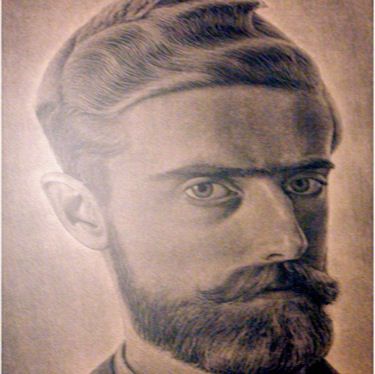You are viewing the article M.C. Escher at Tnhelearning.edu.vn you can quickly access the necessary information in the table of contents of the article below.

(1898-1972)
Synopsis
Born on June 17, 1898, in Leeuwarden, Netherlands, illustrator M.C. Escher developed a print and engraving style that distinctively played with orientation and space. Influenced by Moorish designs in Spain, works like “Day and Night” featured interlocking forms and transformation on a surreal canvas. Later embraced by both artistic and math/science communities, Escher died on March 27, 1972.
Background
Maurits Cornelis Escher was born on June 17, 1898, in Leeuwarden, Netherlands, to Sarah and George Escher. The youngest of five brothers, Escher had an ability to visualize distinct spatial patterns from childhood, and, though not faring well in much of his earlier studies, he attended Haarlem’s School for Architectural and Decorative Arts.
There, Escher decided to take up graphic arts under the recommendation of his mentor, Samuel Jessurun de Mesquita. His earlier work included nudes and innovative portraiture captured in woodcuts, linoleum cuts and lithographs, such as the interconnected “Eight Heads” (1922).
Unique Perspectives
Escher traveled to the Mediterranean in the early 1920s and was profoundly influenced by the wonders of the Moor-designed Alhambra Palace in Granada, Spain. He met Jetta Umiker in 1923; they married the following year, going on to have three children.
Establishing a home in Rome with his family, Escher worked on engravings and prints that captured natural landscapes and architecture, startlingly playing with perspective, orientation and shadow. He also created more human-oriented work, including a 1925 rendering of his wife and several self-portraits, such as 1935’s “Hand With Reflecting Sphere.”
Famous Math-Oriented Art
With the rise of fascism in Italy, the Eschers relocated to Switzerland in 1935, though they soon took a maritime journey to Spain, returning to Alhambra Palace and visiting La Mezquita (“Mosque”) of Cordoba as well. Escher was inspired by the structures’ complex designs, and further focused his work on tessellation and repeating patterns, often featuring overlapping, interlocked images morphing into something else, as seen in his “Metamorphosis” and “Development” series.
The Eschers had moved to Belgium in 1937, but with the invasion of Nazi forces, left for Holland in 1941. He continued to create eye-opening dreamscape work such as “Up and Down” (1947), “Drawing Hands” (1948), “Gravity” (1952), “Relativity” (1953), “Print Gallery” (1956) and “Ascending and Descending” (1960). In addition to eventually becoming a lauded international artist with mounted exhibitions, Escher was embraced by mathematicians and scientists, as much of his heavily researched, precise output embodied or explored concepts around geometry, logic, space and infinity.
Death and Legacy
M.C. Escher died on March 27, 1972, in Laren, Netherlands, leaving a legacy of more than 2,000 pieces. His work has continued to be exhibited, and scholars have continued to explore the mathematical implications of his art into the 21st century. Published retrospectives include M.C. Escher: The Graphic Work and The Magic Mirror of M.C. Escher.
QUICK FACTS
- Name: Maurits Cornelis Escher
- Birth Year: 1898
- Birth date: June 17, 1898
- Birth City: Leeuwarden
- Birth Country: Netherlands
- Gender: Male
- Best Known For: M.C. Escher was a 20th century Dutch illustrator whose innovative works explored echoing patterns, perception, space and transformation.
- Industries
- Art
- Astrological Sign: Gemini
- Schools
- School for Architectural and Decorative Arts (Haarlem)
- Nacionalities
- Dutch
- Occupations
- Illustrator
- Death Year: 1972
- Death date: March 27, 1972
- Death City: Laren
- Death Country: Netherlands
Fact Check
We strive for accuracy and fairness.If you see something that doesn’t look right,contact us!
CITATION INFORMATION
- Article Title: M.C. Escher Biography
- Author: Biography.com Editors
- Website Name: The Biography.com website
- Url: https://www.biography.com/artists/mc-escher
- Access Date:
- Publisher: A&E; Television Networks
- Last Updated: April 13, 2019
- Original Published Date: April 2, 2014
QUOTES
- The ‘flat shape’ irritates me—I feel as if I were shouting to my figures, ‘You are too fictitious for me; you just lie there static and frozen together; do something, come out of there and show me what you are capable of!’
- I have had a fine old time expressing concepts in visual terms, with no other aim than to find out ways of putting them on paper. All I am doing in my prints is to offer a report of my discoveries.
- I don’t grow up. In me is the small child of my early days.
- So let us then try to climb the mountain, not by stepping on what is below us, but to pull us up at what is above us, for my part at the stars; amen.
- I have often felt closer to people who work scientifically (though I certainly do not do so myself) than to my fellow artists.
Thank you for reading this post M.C. Escher at Tnhelearning.edu.vn You can comment, see more related articles below and hope to help you with interesting information.
Related Search:



